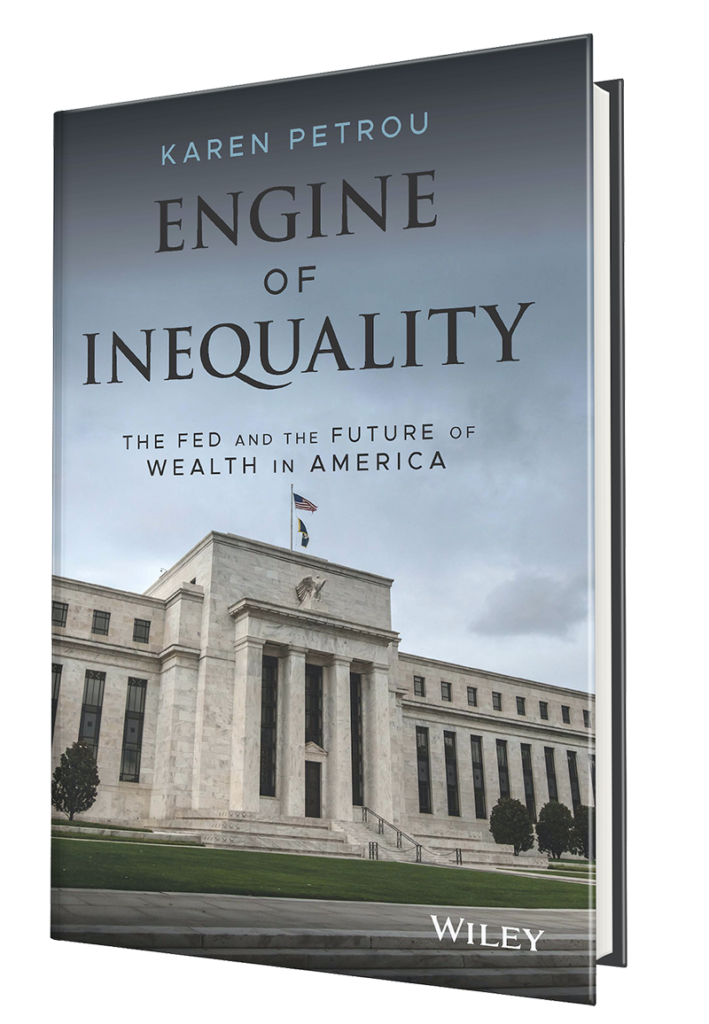Our Services
Engine of Inequality, by Karen Petrou
The first book to reveal how the Federal Reserve holds the key to making us more economically equal, written by an author with unparalleled expertise in the real world of financial policy.
Following the 2008 financial crisis, the Federal Reserve’s monetary policy placed much greater focus on stabilizing the market than on helping struggling Americans. As a result, the richest Americans got a lot richer while the middle class shrank and economic and wealth inequality skyrocketed. In Engine of Inequality, Karen Petrou offers pragmatic solutions for creating more inclusive monetary policy and equality-enhancing financial regulation as quickly and painlessly as possible.
“Petrou’s book uncovers a hidden engine of our skyrocketing inequality: financial-policy. In an accessible and engaging prose, Petrou takes us through the inner workings of monetary policy at the Fed and financial regulations, how they’ve made inequality worse and how they could instead be retooled to take us to a more equitable future. A novel look at the problem of inequality and bold ideas to help resolve it. A must read.”—Emmanuel Saez, Professor of Economics at the University of California Berkeley and author of The Triumph of Injustice
Read full description and reviews.

Industry Expert
Federal Financial Analytics (FedFin) is a Washington-based financial services-consulting firm that has for decades attracted a high-powered clientele in Washington, on Wall Street, and among global central bankers. Since 1985 FedFin has provided a unique blend of analysis and strategic advice on public policy, regulatory, and legislative issues for industry and governmental clients doing business in the U.S. and abroad.
A proprietary think-tank for its clients, FedFin reviews critical federal and global policy developments in banking, insurance, asset management, and mortgage finance, analyzes them in great depth, and then advises clients on whether what they want can be made to work for them, within the policy environment and for the financial system. It is FedFin’s guiding principle to be an honest broker, and clients depend on the fact that the firm does not offer lobbying or any other services that could compromise its objectivity and independence.
As seen In:
In the News
American Banker, Friday, April 19, 2024
Is the Fed board eroding regional Fed banks' independence? By Kyle Campbell The Federal Reserve Board of Governors has a greater say over leadership at the reserve banks than it once did. But whether that benefits the central banking system is an open debate...Karen Petrou, managing partner of Federal Financial [...]
Marketplace, Wednesday, April 11, 2024
What do bank earnings tell us about the economy? By Mitchell Hartman It’s the second week of April, which means spring is in the air and daffodils, cherry trees and lilacs are blooming. Here at Marketplace, it also means earnings season is starting. Corporate profit-and-loss reports for the January-to-March quarter kicked [...]
Marketplace, Friday, April 5, 2024
When is strong hiring too strong? by David Brancaccio Hiring in the month that just ended was quite a bit stronger than expected, with more than 300,000 jobs added to payrolls and the unemployment rate falling slightly to 3.8%. That’s continuing the Fed’s interest rate predicament. We’ll discuss with Karen Petrou, [...]
Issues in Focus
The Vault
FedFin on: Fed Systemic-Risk Assessment: Some Worries, No Troubles
The latest Federal Reserve financial-stability assessment continues the Fed’s practice of detailing vulnerabilities without drawing bottom-line conclusions; the Board once did so, but ceased this practice after opining that the financial system’s risk was “moderate” shortly before the 2020 crash. The Board’s report now also says that it assesses vulnerabilities, not the likelihood of near-term shock. Survey respondents do make this assessment, with this report showing a striking increase in concerns [...]
Karen Petrou: Credit-Card Surcharges: One Inflationary Culprit the CFPB Could Catch
One could go on – indeed many do – about whether inflation is showing enough signs of a slow-down to warrant lower interest rates. I’ve said before that lower rates won’t have the housing-affordability benefits advocates expect, but this doesn’t address the underlying issue of just how hot inflation may be running. I’m not sure if anyone – including the Fed – really knows, but battles on my neighborhood listserv [...]
Karen Petrou: The FDIC Plan to End Too-Big-to-Fail Brings Promise of More Bailouts
In 2013, the FDIC issued a short, unilluminating paper purporting to show how the agency would implement one aspect of the orderly-liquidation authority (OLA) Congress granted in 2010 to prevent the profligate bailouts that blighted the great financial crisis. I was unconvinced by the 2013 paper and even more perplexed when years passed and the utterance on single-point-of-entry (SPOE) resolutions was all the FDIC deigned to pronounce. After all, if [...]



